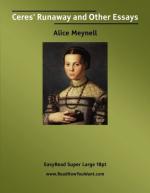In those days Englishmen had to breast the times as they were. They had the privilege of their latitude—vigorous and rigorous seasons. They had a year full of change—their time was stretched whether with impatience or with patience, with conflict or with felicity. Their salt meats were not the worst of it; there was the siege of darkness, the captivity of cold, the threat of storm, and the labour to close with the closing enemy, to break ways and save animals alive, and keep the laws in force in the street in the long and secret nights. From such a season of winter at home, winter well known, men broke free to hail their daffodils. They found them, short, strong, and shivering, in the still open and undefended woods. In the springs before Chaucer, and earlier than the day of the first spring lyric, in the same places grew the keen wild flowers as now; but they assuredly were marked with another welcome; they made memories; this year’s wild harvest was not confused with that of last year, or of half-a-score of years gone by. Distance of vital time set the springs far apart, and made the daffodils strangers.
They were greeted with the courtesy due to strangers, so fresh must have been the senses of the villager, and of the citizen of the village town. Suburbs divide a city from the fields as walls did never. He of old went from a little town, close and serried as a new box of toys, with one step into the unsmirched country, carrying an unsated heart. Refreshed with the animating compulsion of changeful life were man and woman, and much like their child in a constant capacity for unique experiences, unique days, years that are separate, known, and distinguishable, and not only separate but long.
Indeed, some of us who travel hardly know how to remedy our fugitive, resembling, hastening, and collapsing seasons, even by means of this sovereign remedy of travel. It is to be feared that a modern journey is not always to us so bracing a manner of living as was the untravelled journey of hard days at home to the ancient islander. To journey as he did, keeping his feet, with a moving heart against the moving seasons, to resist, to withstand, widened the hours; but his posterity are taking all means to narrow their own, even on the railway. To go the same way every year, for instance, is to lose, when a few such years are gone, nearly all the gain to life. To take no heed at all of the way, but merely to be by any means at the end of the travelling, to sleep or go by night, and to calculate Europe by hours, half-hours, junctions, and dining-cars, is but to close up the time as though you closed a telescope. A long railway journey and a long motor journey may be taken with the flight of time as well as against it, and the habit of summaries can use these too to its own end. Precipitate, unresisting, are the day in the train and the heedless night. We love to reproach ourselves with living at too great a speed, having, perhaps, no sense of the second meaning of the phrase. Medicine may, perhaps, fulfil her promise of giving us a few more years, but habit derides her by making each year a scanty gift.




